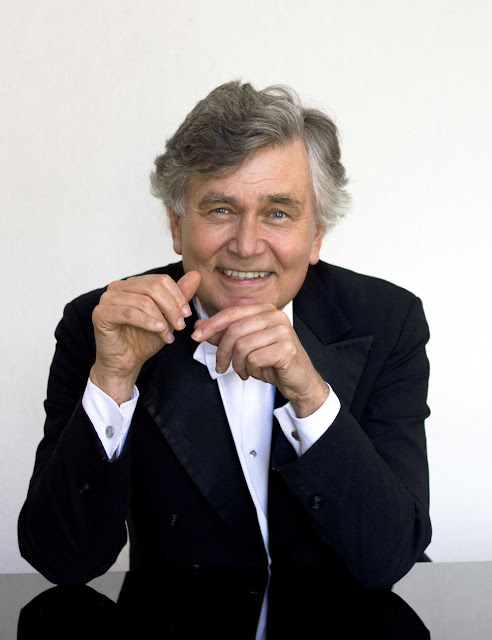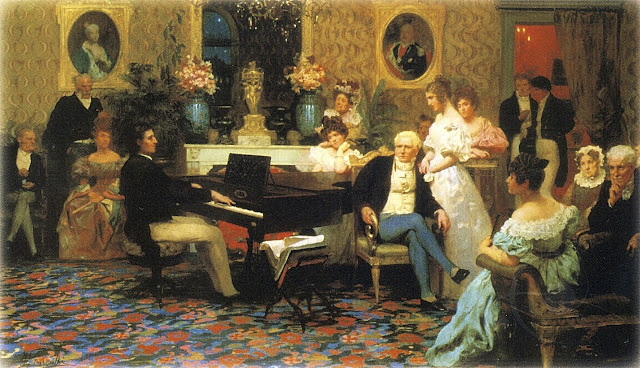Eugen Indjic - The passing of great pianist and true artist, 29th February 2024
 |
| Eugen Indjic (1947-2024) |
I was deeply shocked to hear of his death shortly after waking this morning.
A gentle and civilized cosmopolitan man, warm, humorous, engaging, generous, a refined musical artist and magnificent pianist who had a profound understanding of Chopin.
I was fortunate to have heard him in moving recitals and as a teacher in empathetic Masterclasses in Poland at Duszniki Zdrój and Warsaw.
And he was only 76 …..
During his career he was successful in three piano competitions:
- 8th International Piano Competition Fryderyk Chopin (1970) - IV Prize
- Leeds International Piano Competition (1972) - 3rd prize
- International Master Piano Competition Arthur Rubinstein (1974) - Second Prize
He came from a different world of
musical sensibility to this one and we shall not see his like again. A rare
spirit, musical voice and a cultivated character of man.
As a small tribute, all I can offer is a review I wrote years ago of a recital he gave at the historic spa town of Duszniki Zdrój in Poland, the oldest piano festival in the world.
Chopin once gave a charity recital there which has never been forgotten. It seems fitting in a mysterious, almost magical way, that Indijc should die so close to the birthday of his beloved composer.
In this small tribute to genius, I have not mentioned the popularity of this pianist in Poland or elements of his fascinating biography, studying piano and music at the highest level with Arthur Rubinstein, Clifford Curzon and Nadia Boulanger. You can read about these great achievements in more detail here:
https://ipm.am.katowice.pl/eugene-indjic.html
There was a
Polish National Radio 2 (Dwojka) programme this afternoon with rare
recordings of Eugen Indjic entitled Chopin osobisty (Personal
Chopin) at 16.00 CET on Sunday March 3rd.
It was conducted by the talented and musically deeply informed presenter Róża Światczyńska (in charming Polish).
If you missed the programme it is now available as a podcast together with her other marvellous 'Personal Chopin' programmes.
https://www.polskieradio.pl/8/521/Artykul/3343986,eugen-indjic-wspomnienie-wybitnego-pianisty
This was a wonderful panorama of Eugen Indjic's Chopin interpretations. His deep emotional expressiveness and soul was clear from the first moments. Heartbreaking nostalgia suffuses his mazurkas. A true aristocrat of the keyboard whose playing Arthur Rubinstein guided, profoundly respected and loved. The G minor Ballade was magnificent in structure and interpretation possessing intense dramatic narrative force and irresistible momentum.
Indjic had an understanding of Chopin far beyond the usual musical consciousness of pianists - such divine cantilenas never descending into sentimental bathos. The B minor Sonata was monumental in emotional scope. The expressively demanding Largo suffused by passionate regrets rather than the simple, rather unfocused, lyrical 'poetic' reflections one often hears. The urgent Presto indicated supreme command of the keyboard and the tempo at a true 'non tanto' which addressed the power and accumulating momentum to the triumphant conclusion.
Róża Światczyńska sensitively referred to his French culture, refinement and elegance so appropriate to Chopin's compositions but often missing in the muscularity of performances today. One must never overlook the magical balance of male and female temperament in Chopin. This profoundly musical artist gave us a sense of nostalgic poignancy rarely heard.
The fine and
highly respected, popular Polish music critic, commentator and presenter
Adam Rozlach, who produces fine classical music programmes broadcast on Polish National
Radio 1 (Jedynka) and Polish television, also produced a programme on Eugene Indjic. You can
listen to Adam Rozlach (also in Polish) with other rare recordings here:
Duszniki Zdrój
Saturday 6 August 2016 Chopin Manor
20.00
Eugen Indjic
In this
recital we moved into a sound world of touch, tone and sensibility of a very
different time and tradition to that pertaining for the young tyros of 2024.
Born in 1947 in Belgrade, the influence of two of his mentors, Arthur
Rubinstein and Nadia Boulanger, were immediately apparent in his sound world.
If I were to attempt to encapsulate the tone and feeling of the entire recital
in a few words I would say 'a triumph of the civilized' in the most
uplifting sense of that word.
He opened with
five Debussy Preludes from Book II (1910-1912). Such selected
small groups for performance were favoured by the composer, depending on the
particular affinity for them felt by the pianist.
I felt Indjic
finely captured the mysterious unity of the nature of melancholic beauty in the
face of death in Feuilles mortes (Dead Leaves). A lovely
impressionist portrait in rich colour. Les fées sont d'exquises
danseuses (Fairies are Exquisite Dancers) was charming in its fantasy
- a more innocent world captured here. The quirky influence of Erik Satie on
Debussy seemed inescapable to me in Général Lavine – eccentric. The
water nymph Ondine captured us as the Fireworks (Feux
d'artifice) dazzled us. A beautiful impressionistic
performance without dynamic or other exaggerations.
He then
performed the remarkable Schumann Davidsbündlertänze (Dances
of the League of David), Op. 6 (1837), a set of 18 pieces and one of the
great works of Western Romantic piano literature. The Davidsbündler (League
of David) was a music society founded by Schumann in his literary musings. The
League itself was inspired by real or imagined literary societies such as those
created by E.T.A Hoffmann. The theme was based on a mazurka by Clara Wieck and
was inspired by his love of her which permeates all the works of this period.
Literature and music had a symbiotic relationship for Schumann and was a source
of the unique qualities of his genius.
The pieces
are not really dances but musical dialogues concerning contemporary music
between Florestan and Eusebius, characters Schumann created representing the
active and passive aspects of his personality. I cannot here analyze each work
save to say Eugen Indjic captured much of the poetic,
mercurial, impetuous and the lyrical aspects of Schumann's nature.
He preserved the unity of this cycle that allows us to experience ‘music
as landscape’ (Charles Rosen).
After the
interval the Chopin Scherzo in C-sharp Minor, Op. 39. Chopin
completed this work during a period of convalescence in Marseilles. It is 'one
of Chopin's most unusual and original works' (Jim Samson). Certainly it is
the closest Chopin came to the Lisztian idiom and in the bravura writing I felt
Indjic was curiously ever so slightly insecure in this otherwise fine
performance. The contrasting drama which suffuses the work was thus left
somewhat in abeyance.
With great
discrimination we were then treated to the three Impromptus opused
for print by Chopin. Andre Gide wrote of them: The
impromptus are among Chopin's most enchanting works. The great Polish
musicologist and Chopin specialist Mieczyslaw Tomaszewski wrote of them: The
impromptus offer us music without shade, a series of musical landscapes prefiguring
impressionism.
The
autonomous Impromptu genre was not that well established, even
for Schubert, when Chopin composed his first but as the years passed he gave
the form his own particular identity.
Again, a fine,
refined performance lacking in any exaggeration or hysteria
(resisting the temptations of the Fantasy-Impromptu)
- just the developed sensibility of a mature artist confronted with some
of the most affecting of Chopin's music.
The recital
concluded with a tremendously dramatic and narrative Ballade in G
Minor, Op. 23. The Chopin Ballades in some ways
are miniature operas and this was something that sprang to my mind
in this theatrical performance. At least for me the feeling of tension
that was evident by occasional insecurities only added to the intensity
for me, the tension of a pianist courageously pushing and still testing his own
limits. All the greatest artists have done so - Horowitz, Schnabel,
Cortot...
As encores
the quite beautiful Chopin Mazurka op. 30 No.1, Schumann's Aufschwung ('Soaring')
from the Fantasiestücke, Op. 12 and to conclude a final Chopin mazurka of the utmost
refinement.



Comments
Post a Comment